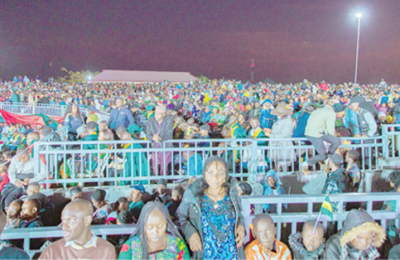
TIMES and tides change. Seasons flicker and flutter, and the weather varies. The message in all this is the transience of everything in life. Nothing really is permanent; except change itself. A time there was when their word was law. Their reverence from their subjects was so high to the sky. They were addressed as the one who does no wrong, the real unquestionable; one second only to the gods. But all that was in the past. Yes! They still bear the monicker, Royal majesty, their Highnesses or their eminence, but that is only in word. In deed and in truth they have been stripped of their liegedom and are now subject to the authority of those who are supposed to be their subjects. In those halcyon years of traditional rulership, who dare query a Kabiyesi or an Emir for insubordination? The natural response to such a sacrilegious or even iconoclastic act would have been to whom can His Majesty be subject? A review of one or two Yoruba maxims will reveal the awesome reverence in whichtheir monarchs were once held. When they say Oba baloriohungbogbo, it simply means the King reigns on everyone and everything. When they say Oba n pe o, o loo n dafa, tifabaf’ore to bao f’ore nko, the simple message is: if the King sends for you and you say you should be allowed to consult the gods, have you realized that the gods’response may be favourable while the king thinks otherwise. This simply means it makes better sense to go answer the king first before coming back to consult the gods. But I only speak of the nostalgic past. Today, times have changed. Today’s traditional ruler occupies his throne at the mercy of the one who wields political power. The latter has become the de facto liege but it appears this fact is yet to sink into the consciousness of many of the once highly reverenced traditional rulers.
Since the advent of colonial powers, traditional rulership has been struggling to come to terms with the reality that the powers and authority with which their thrones were once associated now reside elsewhere. Failure to realise this has cost many their crowns and turbans. Way back 1888, resistance to the new political power cost Jaja of Opobo his throne. He was dethroned and outlandishly banished to West Indies where he died. Oba OvoramenNogbaisi of Benin suffered the same fate after his kingdom was invaded by the British forces in 1897. He was dethroned and banished to Calabar where he lived till his death. Muhamadu Sanusi, grandfather of the newly re-installed Emir of Kano, was in 1963, served the same pill of dethronement by the then Premier of the Northern Region, Sir Ahmadu Bello. Before then, Sultan MuhamaduTambari of Sokoto had been dethroned in 1931. For being perceived as antagonistic to the Action Group (AG) -led government in the Western Region, Oba Lamidi Olayiwola Adeyemi 1 and the Olowo of Owo, Oba OlateruOlagbegiwere respectively dethroned in 1955 and 1966. And if you think many of the cases of dethronement listed here happened in the distant past, there are many others that happened not as long ago as the aforementioned. In 2005, Mustapha Jokolo was dethroned by the Kebbi State Governor, Adamu Aliero on grounds of insubordination. Earlier in nearby Sokoto State, in 1996, Emir Ibrahim Dasuki was removed after irreconcilable differences with the military Government of Sanni Abacha. In 1983, it took the intervention of the court for Oba SikiruAdetona, the Awujale of Ijebuland to escape the loss of his throne by the whiskers when he was reinstated by the Appeal Court in Ibadan after he had been dethroned by the then Governor of Ogun State, Chief Bisi Onabanjo.

There were other traditional rulers who though were not removed but were left on the throne under serious condition of persecution and deprivation. One of such was the late Odemo of Isara, Oba Samuel Akinsaya. On account of political differences between him and Chief S.L Akintola, the premier of the Western Region, Oba Akinsaya had his salary reduced to half a penny per annum. For daring to travel to Israel without permission in 1984, Ooni Okunade Sijuwade and the Emir of Kano, Ado Bayero were suspended for six months and their movements restricted to within their Local Council Area
The list can goon and on but one common thread in many of the cases of dethronement is that they did not occur because the monarchs ran foul of any sacred tradition, beliefs or customs of their land. They were all largely politically motivated. The question now is, who is the real Kabiyesi (the unquestionable one) between the traditional ruler and the political ruler? The answer speaks for itself. The truth is that republicanism and monarchial rulership are not only antithetical,they are like night and day that never have a rendezvous; especially in our own winner takes all political system where political actors want to arrogate all powers to themselves; without sharing with anyone.
If anyone is still in doubt about the real custodian of power, a recent viral video of an encounter between a traditional ruler in Ogun State Olu of Itori, Oba FataiAkamo and the Ogun State Governor, Prince Dapo Abiodun will suffice to convince doubters about who truly wields power in all its configuration. In the video, the Oba is seen squatting before the Governor while discussing with the Governor. While many were enraged by this scenario and saw it as standing tradition on its head, it could just be that the Olu of Itori is not ready to live in denial of where power truly resides. The Oba may just have been borrowing himself some sense, to use the popular street lingo. Afterall , is it not sheer folly to live in Rome and strive with the Pope?
I watched with amusement as the newly re-installed Emir Lamido Sanusi recalled circumstances leading to his dethronement in 2020. Stating that he was queried for insubordination, he wondered why someone not superior to him could query him for insubordination. With due respect to Emir Sanusi, even as he regains his once lost throne, if he still carries on with this mindset of being superior to the Governor, he may soon run into trouble so soon again. For any traditional ruler of today’s Nigeria to think that the Governor is not superior to him is to continue to live in wish-land. If the Governor is not superior to the traditional ruler, why is it then that the former can query the latter and not the other way round? Need we belabour the point that queries can only be issued from the superior to the subordinate?
Emir Sanusi will do himself a world of good if he lives not with the air of superiority over the Governor but with the consciousness that those who brought him back to the throne did not do so because they like him so much. They did so, as a means of settling political scores with political rivals in Kano State. Let those who like Sanusi pleasedrum it loud into his ears that the politicians in Kano and other places have found traditional rulership as a pliable tool to be used to even scores with rivals and to attain their political goal. They have found in the traditional rulers, easy pawns that can be tossed around on their chessboard as it catches their fancy. If Sanusi fails to realise this, the musical chair of dethronement in Kano has just begun.
- Adegoke is a Lagos-based media consultant and public affairs analyst.
ALSO READ: IGP blames internal security threat on corruption, impunity in governance structure







